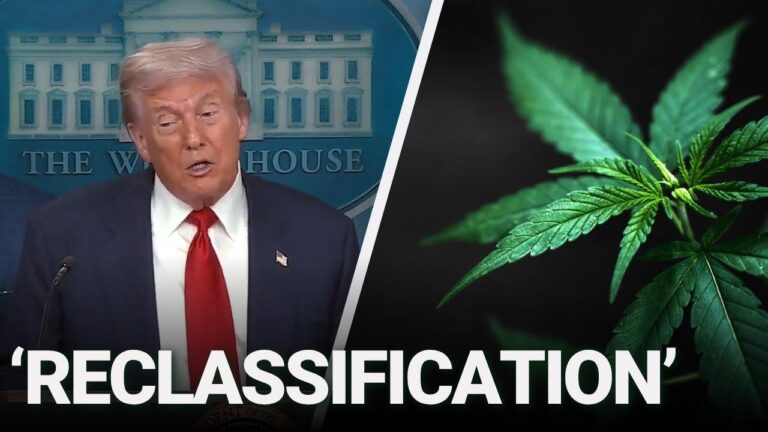In a significant development that could reshape federal drug policy, President Donald Trump is reportedly considering the reclassification of marijuana under federal law. Sources indicate that this move might ease restrictions on the use and research of cannabis, potentially impacting criminal justice, medical treatment, and the rapidly growing cannabis industry across the United States. As the debate over marijuana legalization intensifies nationwide, this potential shift signals a notable change in the federal government’s stance on the substance, with wide-ranging implications for states, businesses, and consumers alike.
President Trump Signals Potential Shift in Marijuana Federal Policy
In an unexpected development, President Trump has hinted at a potential reclassification of marijuana under federal law, signaling a major policy shift. Currently designated as a Schedule I substance alongside drugs like heroin, the president’s comments suggest that cannabis could be downgraded to a less restrictive category. Advocates argue this change would open doors for increased medical research and ease banking restrictions for cannabis-related businesses, which have been hampered by the federal classification.
Experts speculate that the move could impact various sectors positively, including criminal justice reform and state economies that heavily depend on cannabis industries. Below is a snapshot of possible reclassification impacts:
- Medical Research: Easier access to funding and clinical trials
- Banking Industry: Improved financial services for cannabis businesses
- Legal System: Reduced non-violent marijuana-related incarcerations
- State Economies: Boost through expanded legal markets
| Schedule Level | Current Status | Potential Benefit |
|---|---|---|
| Schedule I | High abuse potential, no accepted medical use | Restrictive, limited research |
| Schedule II or III | Recognized medical uses, lower abuse potential | Facilitated medical use, research funding |
Implications of Marijuana Reclassification on Criminal Justice Reform
Reclassifying marijuana under federal law would mark a paradigm shift in the approach to drug policy and criminal justice reform. Currently listed as a Schedule I substance, marijuana is treated as having a high potential for abuse and no accepted medical use, which has fueled stringent legal penalties and contributed to lengthy incarceration rates. A reclassification could lead to reduced charges for marijuana-related offenses, offering a pathway to alleviate the overcrowding in prisons and correct decades of disproportionate enforcement impacting minority communities.
Beyond sentencing reforms, such a change could influence policing practices and resource allocation. Law enforcement agencies might prioritize more serious crimes over marijuana-related cases, potentially restoring strained community relations. The ripple effects extend to the court system as well, possibly decreasing the backlog of cases and enabling faster resolutions. Below is a summary of anticipated impacts on criminal justice metrics:
| Aspect | Current Status | Post-Reclassification Impact |
|---|---|---|
| Incarceration Rates | High due to felony convictions | Significant reduction in marijuana-related imprisonments |
| Sentencing | Harsh mandatory minimums | Possibility for lighter sentences and alternatives |
| Law Enforcement Focus | Heavy emphasis on marijuana crimes | Shift toward violent and property crimes |
| Community Impact | Disproportionate minority arrests | Potential reduction in racial disparities |
- Decriminalization implications: fewer arrests and lowered incarceration costs.
- Judicial relief: reduced caseloads could speed up court proceedings.
- Social equity: might aid in addressing historic injustices linked to marijuana prohibition.
Economic Opportunities Emerging from Federal Marijuana Legalization
Reclassifying marijuana at the federal level could unlock significant economic potential across multiple sectors. Entrepreneurs and established companies alike would be positioned to capitalize on a market that has, until now, operated under the constraints of legal ambiguity. Investors, in particular, are poised for a surge of activity, as the removal of federal restrictions would attract substantial capital inflows, stimulating innovation in cultivation technology, product development, and distribution networks.
Job creation stands out as one of the clearest benefits of federal legalization. With an estimated 250,000 new positions potentially emerging within the next five years, industries tied to agriculture, retail, and regulatory compliance are expected to experience significant growth. Key economic impacts include:
- Increased tax revenue: States and the federal government would benefit from billions in new tax income.
- Expansion of small businesses: Easier access to banking and credit would help local entrepreneurs flourish.
- Boost in tourism: Cannabis-friendly destinations may see a surge in visitors, enhancing hospitality sectors.
| Sector | Projected Growth | Key Benefit |
|---|---|---|
| Agriculture | 30% increase | Enhanced cultivation practices |
| Retail | 45% increase | Expanded product offerings |
| Financial Services | 50% increase | Easier access to loans and banking |
| Tourism | 20% increase | Growth in cannabis tourism |
What Businesses and Consumers Should Expect Moving Forward
Businesses within the cannabis industry should prepare for a potential paradigm shift that could significantly ease regulatory pressures. If marijuana is reclassified federally, companies may gain access to traditional banking services and reduced legal risks, allowing for smoother operations and more robust investments. This potential change is expected to open doors to expanded market opportunities, especially in states where marijuana remains fully legal under local laws but conflicted by federal policies.
Consumers, on the other hand, could experience benefits such as improved product safety standards and broader availability of marijuana-based products. However, it’s important to remain vigilant about how the regulatory landscape evolves. Key points for consumers and businesses alike include:
- Banking: Easier access to financial services may encourage market growth and transparency.
- Legal clarity: Reduced conflicts between state and federal laws could streamline compliance.
- Product safety: Higher federal oversight may lead to standardized testing and labeling.
- Market expansion: New players could enter the industry, intensifying competition.
| Aspect | Current Status | Expected Change |
|---|---|---|
| Banking | Limited access, mostly cash-based | Expanded access to traditional banking |
| Legal Risk | High due to federal classification | Reduced with reclassification |
| Market Growth | State-dependent and fragmented | More unified and widespread |
| Consumer Safety | Varies by state regulations | Potential for federal standards |
Wrapping Up
As discussions around marijuana policy continue to evolve, President Trump’s potential move to reclassify cannabis under federal law marks a significant development in the ongoing national debate. Such a change could have widespread implications for criminal justice, medical research, and the burgeoning cannabis industry. Stakeholders and lawmakers alike will be closely watching how this decision unfolds, as it could reshape the legal landscape and impact millions of Americans. USA Today will continue to follow updates on this story as they develop.




